#ministerial association
Photo
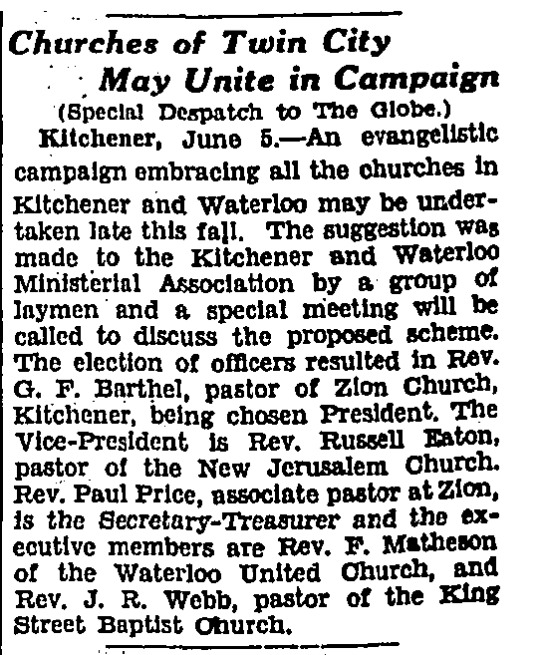
“Churches of Twin City May Unite in Campaign,” Toronto Globe. June 6, 1930. Page 21.
----
(Special Despatch to The Globe.)
Kitchener, June 5. - An evangelistic campaign embracing all the churches in Kitchener and Waterloo may be undertaken late this fall. The suggestion was made to the Kitchener and Waterloo Ministerial Association by a group of laymen and a special meeting will be called to discuss the proposed scheme. The election of officers resulted in Rev. G. F. Barthel, pastor of Zion Church, Kitchener, being chosen President. The Vice-President is Rev. Russell Eaton, pastor of the New Jerusalem Church. Rev. Paul Price, associate pastor at Zion, is the Secretary-Treasurer and the executive members are Rev. F. Matheson of the Waterloo United Church and Rev. J. R. Webb, pastor of the King Street Baptist Church.
#kitchener#waterloo ontario#ministerial association#united church of canada#baptist church#united church#evangelical church#evangelical campaign#christianity in canada#great depression in canada
0 notes
Text
The Commonwealth
My cranky rant for the day :)
Skip if this is of no interest to you, this is just me letting off steam.
Harry and the Commonwealth
I see a lot of misinterpretation of the Commonwealth of Nations with respect to Harry, and it drives me crazy.
Harry can not be 'King of the Commonwealth'. No such position exists.
Harry can not be 'Head of the Commonwealth'. That symbolic position is held by his father, King Charles III. The position is is appointed by the Commonwealth Heads of Government.
If King Charles III resigns form this role (which is highly unlikely), then another Head of the Commonwealth will be elected by the combined Heads of Government of the Commonwealth.
As the past three Heads of the Commonwealth have been the monarchs of the UK, if that trend continues then it is most likely that Prince William will be elected to the position, otherwise it is likely to go to another Head of Government within the Commonwealth, as discussed before the passing of Queen Elizabeth II. Harry is a non contender in my opinion.
The other top-rank positions of power within the Commonwealth of Nations are the Commonwealth Secretary-General and the Commonwealth Chair in Waiting.
The Chair in Waiting is the head of government of the last country to hold the CHOGM, so Harry automatically is not eligible for this role. It rotates once every two years.
The Secretary-General is elected for a maximum of eight years (two four-year terms) by the assembled heads of government and other ministerial representatives at every other CHOGM (so once every four years). Nominations for the election come from the governments of the member nations of the Commonwealth. it is highly unlikely that Harry would be nominated, and even more unlikely that he would be elected. Past Secretary-Generals are career diplomats and/or politicians, and Harry is neither.
The only position that Harry held with the word 'Commonwealth' in the title is the Presidency of the Queen's Commonwealth Trust, a charity that "provide[s] access to a global network of over 850 young leaders who are able to support each other and access insights and resources to further their work and impact." He was allegedly removed from that position in February 2021 and does not appear on the charity's website.
More detailed information on the Commonwealth of Nations below. Feel free to skip, this is for those interested in a bit about how it all works.
The Commonwealth of Nations
The Commonwealth is a voluntary association of 56 independent and equal countries. The member governments agree to shared goals such as development, democracy and peace. The values and principles of the Commonwealth are expressed in the Commonwealth Charter.
Commonwealth Heads of Government (CHOG)
This is the is collective name for the government leaders of the nations with membership in the Commonwealth of Nations. They are invited to attend Commonwealth Heads of Government Meetings every two years, with most countries being represented by either their head of government or head of state. The Commonwealth Heads of Government attend the Commonwealth Heads of Government Meeting, held once every two years (see below).
CHOGM and the Commonwealth Chair-In-Office
Decisions for and about the Commonwealth of Nations are usually made at the biennial Commonwealth Heads of Government Meeting (CHOGM), where the Commonwealth nations' Prime ministers, Presidents, Kings or Queens, and any other heads of government, assemble for several days to discuss matters of mutual interest.
Every two years the meeting is held in a different member state and is chaired by that nation's respective prime minister or president, who becomes the Commonwealth Chair-in-Office until the next meeting.
The last CHOGM took place in Rwanda in 20222. The next one will be in Samoa in 2024. (see https://thecommonwealth.org/chogm)
The current Commonwealth Chair-In-Office is the President of Rwanda, currently Paul Kagame. The primary responsibility of the Chair-in-Office is to host the CHOGM, a responsibility that starts their term as Chair-In-Office.
The Secretariat of the Commonwealth of Nations and the Commonwealth Secretary-General
The main body within the Commonwealth of Nations is the Secretariat. It It is responsible for facilitating co-operation between members; organising meetings, including the Commonwealth Heads of Government Meetings (CHOGM); assisting and advising on policy development; and providing assistance to countries in implementing the decisions and policies of the Commonwealth.
The Secretariat has observer status in the United Nations General Assembly. It is based at Marlborough House In England and has full diplomatic immunity.
The head of the Secretariat is the Commonwealth Secretary-General.
All Secretariat staff report to the Secretary-General, who is responsible for spending the Secretariat's budget, which is granted by the Heads of Government. It is the Secretary-General (not the ceremonial Head of the Commonwealth), that represents the Commonwealth publicly. The secretary-general is elected by the Heads of Government at the Commonwealth Heads of Government meetings for up to two terms of four years.
The Secretary-General used to be assisted by two, then three Deputy Secretaries-General. As those posts have fallen vacant they have not been filled under the current Secretary-General.
The current Commonwealth Secretary-General is Patricia Scotland, Baroness Scotland of Asthal, PC, KC. Her second four year term expires in 2024.
The Head of the Commonwealth of Nations
The Head of the Commonwealth of Nations is a symbolic position. The position represents the association of 56 independent members. Thirty-six member nations are republics, five have monarchies (Brunei, Eswatini, Lesotho, Malaysia, and Tonga), and fifteen member nations who are also commonwealth realms have the monarch of Great Britain. as their Head of State.
The Head of the Commonwealth serves as a symbolic leader, alongside the Commonwealth Secretary-General and the Commonwealth Chair-In-Office, who also represent the Commonwealth.
The Head of the Commonwealth does not have any constitutional role in any Commonwealth state by virtue of their position as Head of the Commonwealth. They keep in touch with Commonwealth developments through contact with the Commonwealth Secretary-General and the Secretariat.
The head of the Commonwealth or a representative has been present in the past at the Commonwealth Games. The Baton Relay, held prior to the opening of each Commonwealth Games, carries a message from the Head of the Commonwealth to all Commonwealth Nations and territories.
The Head of the Commonwealth broadcasts a special message to the population of the Commonwealth on Commonwealth Day, the second Monday in March. They attend an inter-denominational Commonwealth Day service held at Westminster Abbey.
The position of head of the Commonwealth is not hereditary and successors are chosen by the Commonwealth heads of government. That being said, the three current and previous Heads of the Commonwealth have all been the monarchs of the United Kingdom.
REFERENCE WEBSITES
See also wikipedia for a general overview:
58 notes
·
View notes
Text
Feeling emotional about ministerial oaths/affirmations again.
Daniel Mookhey was sworn in today as the NSW Treasurer. He was sworn in on the Bhagavad Gita, the first Australian Minister to do so.


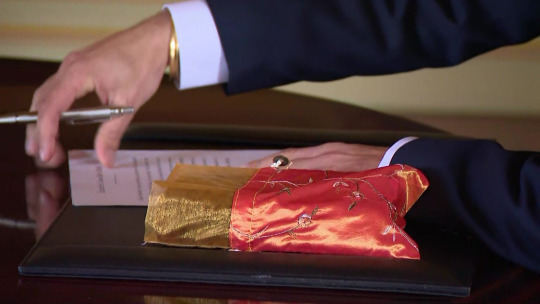
I love it when the books are beautiful, and this one is. Now I need the article someone is undoubtedly drafting up right now about the personal background of this copy (get on it ABC).
It also reminds me, since it IS Ramadan, of my favourite book used in any Australian ministerial oath, the sunset pink Qur’an, the first Qur’an used for a federal ministerial oath.

Along with being visually stunning, the background to this one is just moving. It’s been used by Ed Husic and Dr Anne Aly for their federal Ministerial oaths and affirmations (respectively). It was a gift from the Muslim Women’s Association to Husic by Maha Abdo, who chose it specifically because it had been a gift to her by a group of teenage girls.
“Every young girl had a pink Koran. Pink, what does it stand for? There’s so much in it. I didn’t realise it was to be gifted to this amazing person who was sworn into parliament,” Abdo said, adding she could not divine its purpose until now.
“For me, it is very much about feminity, purity ... it is also hope in the fact that it reminds me, as well, when the sun sets, the sky goes that pinky colour. The sun has set, and now it’s about to rise.”

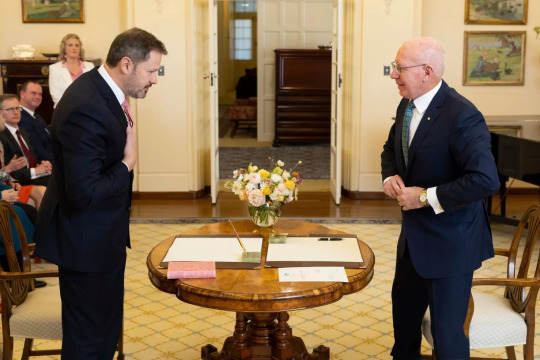

It’s just so beautiful and meaningful (Husic passed it to Aly in the line, and I’ve never been able to figure out if they discussed sharing beforehand or agreed on the day, because Aly was making an affirmation) and it matches both Labor’s colours and their outfits so well. Aly became Minister for Early Childhood and Minister for Youth holding a Qur’an originally chosen and gifted by a group of teenage girls.
More books for oaths should be chosen because they are objectively beautiful pieces of art, as well as being personally meaningful.
62 notes
·
View notes
Photo

“ More than 40 dead and Lima continued in silence “
The poster pasted in the vicinity of the Palace of Justice, in the center of Lima, the Peruvian capital, expresses the indignation at the indolence of the national authorities, state powers and political groups opposed to citizen protests, in the face of dozens of deaths in cities in the interior of the country. Photo: Mariela Jara/IPS
Lima – "We are not terrorists, we are women and men from the highlands who want respect and who do not kill us for asking for early elections and a Constituent Assembly," said Rosa Cachi, an Aymara indigenous woman from Puno, in the southern Andes of Peru, where she The protests against the government of President Dina Boluarte are concentrated.
The protests are concentrated in the southern Peruvian Andes and as a result of the brutal repression, 17 demonstrators died due to the impact of projectiles fired by the forces of order, in addition to a policeman who was allegedly burned by protesters. Adding the 28 deaths that occurred in December in other regions such as Apurímac -land of Boluarte and where the mobilizations originated-, Ayacucho, Arequipa, Junín, Cusco, La Libertad, there are more than 40 victims in the first 34 days of this government of transition, a fact that the National Human Rights Coordinator has described as a massacre. The 17 deaths of civilians occurred in a single day, on January 9, in Puno, one of the Peruvian regions with the greatest poverty and located at more than 3,800 meters above sea level, with a high Aymara indigenous population. The government disqualified the protests and, through the Prime Minister, Alberto Otárola, accused them of being financed by illegal activities such as drug trafficking and foreigners, and announced that order would be restored. On Tuesday the 10th, the cabinet he presides over received a vote of confidence from the Legislative Branch despite the deaths in his to have. For Javier Torres, political analyst and director of Noticias SER, the information portal of the Association of Rural Educational Services, this decision means a political endorsement of the government of Dina Boluarte, whose only response to the protest of the population is indiscriminate repression and the establishment of states of emergency and compulsory social immobilization. This last measure was issued for three days for Puno. “There is also a kind of total impunity, because we have news yesterday (January 10) that in Puno they are looking for the relatives of the victims to give false testimonies to protect the police officers. In this scenario, what the Congress of the Republic has done seems very serious to me,” he stressed.
In a telephone interview with IPS, Torres stated that the government of President Boluarte rests on two pillars: the armed forces, which are her main support, and the parliamentary majority, which has granted a vote of confidence to her ministerial cabinet.
The congressmen who voted in favor are mostly from benches such as Fuerza Popular, which represents Fujimorismo, Renovación Popular and Avanza País, who are from conservative and extreme right positions and have installed the discourse that the mobilizations are instigated by terrorism and they must be totally suppressed. These groups were joined by three others such as Acción Popular, Alianza para el Progreso and Somos Perú. who also defended the argument of the recovery of public order. Faced with this decision, Torres considered that the political class does not recognize the demands of the population. “In Ayacucho, Cusco, Puno, Apurímac, political demands are raised and they are the most democratic that can be given. They ask for an electoral process and a referendum, which is what is behind asking that the president leave and that they close the congress. It has nothing to do with secessionism or with communism or with Evo Morales”, he stated. But that -he added- the political class does not want to see it because the protest is a questioning of the central power, the way in which the elites of this country govern and make decisions, that is what is in question. In his opinion, the only viable way out of the current crisis is the resignation of President Dina Boluarte, the immediate convocation by Congress of general elections and that these be held in the shortest possible time, which would be six months, as he has stated that the National Elections Jury could be possible. “That would lower the pressure on the country. There are other measures that could help, but at this moment it is the institutional solution that we have left, because the other thing is that this government continues to maintain a repressive policy that what it is going to bring is more deaths and it is not going to solve the problem ”, warned. We continue in the fight Rosa Cachi, a Puno artisan from the Quilca peasant community, responded to the IPS call while participating in a citizen mobilization through the streets of downtown Puno demanding justice for the deaths that occurred in her region and rejecting the position of the main authorities of the country that seek to delegitimize their fight.
“They tell us that we are terrorists, that they finance us from another country, that drug traffickers give us money. It is not like this. We are men and women from the highlands, we are natives, we want respect for our native people. They can't treat us this way," he exclaimed. And he continued: “I am in the streets of the city right now because we do not agree with what Mrs. Boluarte says that elections cannot be brought forward this year until 2024, what they want is to stay in power with this Congress that the people reject”. In addition to the advancement of elections, it also demands that a constituent assembly be installed to elaborate a new Constitution. “We live from our pachamama, from our water and look, so many resources from our land that they take away and it is not left for the town or for the countryside. Only at the time of the elections do they arrive saying, brothers and sisters, vote for me. Then they forget. We don't like that, it shouldn't be like that anymore," she questioned.
In addition to the advancement of elections, it also demands that a constituent assembly be installed to elaborate a new Constitution. “We live from our pachamama, from our water and look, so many resources from our land that they take away and it is not left for the town or for the countryside. Only at the time of the elections do they arrive saying, brothers and sisters, vote for me. Then they forget. We don't like that, it shouldn't be like that anymore," she questioned. Cachi, who is also dedicated to family farming, lamented the indolence of the powers of the State in the face of the deaths that occurred in his region, Puno. “We are mobilizing for our dead who are not recognized by Mrs. Dina Boluarte, the ministerial cabinet or Congress. It is an indignation for us, that is why we have come here in mourning, with black clothes. They don't have to kill us for protesting and demanding what is fair," he insisted. In Lima, citizen vigils have been held in front of the Palace of Justice, in the center of the capital, to express rejection of the government's repressive policy, show solidarity with the families of the victims and demand justice. On the 10th, the National Prosecutor's Office announced the start of a preliminary investigation for the alleged crimes of genocide, qualified homicide and serious injuries against the Peruvian president, the head of her cabinet and the defense and interior ministers, the latter responsible for the actions of the armed forces and the national police respectively. The investigations will cover the deaths during the demonstrations in December and January. Filed in: Featured Cover, Governance, Report, Latest News Latin America and the Caribbean, Crime and justice, Democracy and Politics
https://ipsnoticias.net/2023/01/gobierno-de-boluarte-en-peru-podria-incrementar-represion-para-sostenerse/
#Peru#indigenous peru#racisme#peru highlands women#indigenous repression#Aymara indigenous population#Juliaca Puno Peru#human rights
88 notes
·
View notes
Text
Charles Haddon Spurgeon
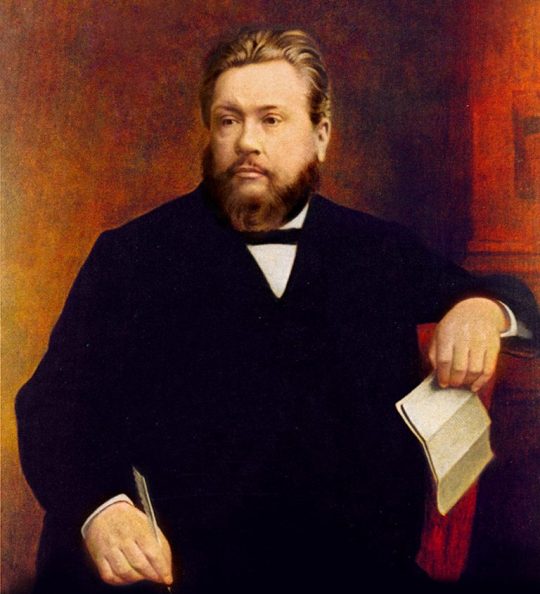
Charles Haddon Spurgeon (1834-1892) was called to pastor the New Park Street Chapel, London, when he was only nineteen. This church became the 6,000 seat Metropolitan Tabernacle, which he pastored until his death at age 58. Through his relatively short but phenomenally productive ministry, Spurgeon pastored, directed a Pastor’s College, oversaw a Bible and tract society, organized Stockwell Orphanage, published the monthly magazine Sword and Trowel, edited a weekly sermon (among the several he preached each week), and wrote a number of books, including his well-known Treasury of David.
Timeline of the Life of Charles Haddon Spurgeon (1834-1892)
1834 (June 19) – Born at Kelvedon, Essex.
1850 (January 6) – Converted at Colchester.
1850 (April 4)- Admitted to Church membership at Newmarket.
1850 (May 3) – Baptized in the River Lark at Isle-ham.
1851 – Becomes Pastor of Waterbeach Baptist Chapel.
1853 – First literary effort, No. I of Water-beach Tracts published.
1853 (December) – Preaches at New Park Street Chapel, London, for the first time.
1854 (April) – Accepts Pastorate of New Park Street Chapel.
1855 (January) – First sermon in the “New Park Street Pulpit” published.
1855 (February) – First preaches at Exeter Hall.
1855 (July) – Mr. T. W. Medhurst becomes C. H. Spurgeon’s first ministerial student.
1856 (January 8) – Marries Miss Susannah Thompson.
1856 (June) – Metropolitan Tabernacle Building Committee formed.
1856 (September 20)- Twin sons Thomas and Charles born.
1856 (October 19) – Surrey Gardens Music Hall Disaster.
1856 (November 23) – Services recommenced at the Music Hall.
1857 – A second student accepted by C. H. Spurgeon and the Pastor’s College practically founded.
1857 (October 7) – Preaches to 23,654 persons at the Crystal Palace on Fast Day.
1859 (August 16) – Foundation Stone of the Metropolitan Tabernacle laid.
1861 (March 18) – Metropolitan Tabernacle opened with a great prayer meeting.
1864 (June 5) – The famous “Baptismal Regeneration” sermon preached.
1866 – Metropolitan Tabernacle Colportage Association founded.
1867 (March 24-April 21) – Sunday services, each attended by 20,000 persons, held at the Agricultural Hall, Islington, during the renovation of the Metropolitan Tabernacle.
1867 – Stockwell Orphanage (Boys’ side) founded.
1873 (October 14) – Foundation Stone of the Pastors’ College Building laid.
1875 – Mrs. Spurgeon’s Book Fund inaugurated.
1879 – Girls’ Orphanage founded.
1884 (June 18 and 19) – Jubilee Celebrations and presentation of testimonial (£4,500).
1887 (August) – First “Down-grade” paper published in “The Sword and the Trowel.”
1887 (October) – Withdrawal from the Baptist Union.
1891 (June 7) – Last sermon at the Metropolitan Tabernacle.
1891 (October 26) – Goes to Mentone for the last time.
1892 (January 31) – Passes away.
1892 (February 11) – Interred at Norwood Cemetery.
8 notes
·
View notes
Photo
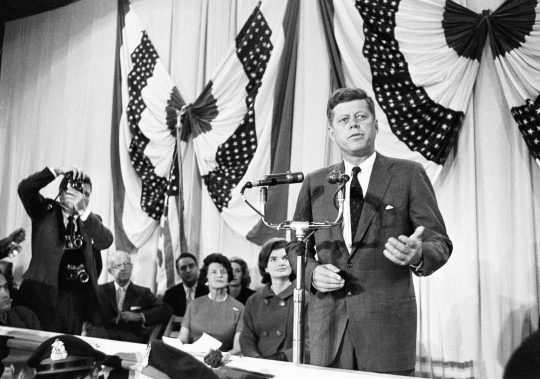
I believe in an America where the separation of church and state is absolute — where no Catholic prelate would tell the President (should he be Catholic) how to act, and no Protestant minister would tell his parishoners for whom to vote — where no church or church school is granted any public funds or political preference — and where no man is denied public office merely because his religion differs from the President who might appoint him or the people who might elect him.
—John F Kennedy, Speech to the Greater Houston Ministerial Association, Sep 12, 1960
[Scott Horton]
60 notes
·
View notes
Text
Hungary’s ruling party on Tuesday submitted a draft act that the government claims will rid the country’s politics of foreign money, but opposition parties agree is designed to neuter criticism ahead of the elections for the European Parliament in June 2024 and build on Fidesz’s campaign centred on “national sovereignty”.
Tabled by Fidesz parliamentary leader Mate Kocsis, the bill on “protecting national sovereignty” calls on lawmakers to amend the constitution to include a passage on sovereignty.
“Hungary’s sovereignty is impaired – and it also carries a heightened risk to national security – if political power gets into the hands of persons or organisations dependent on any foreign power, organisation or person,” the bill reads.
As expected, the act would make accepting foreign funding while standing for election punishable by up to three years in prison. It would also create a new agency to monitor and investigate foreign interference in politics, including NGOs or other organisations whose “activities using foreign funding may influence the outcome of elections” or which “engage in or support activities to influence the will of voters using foreign funding”. The Sovereignty Protection Office will be set up by February 2024, but will not have any sanctioning power other than publishing an annual “sovereignty report” and passing on any information to the authorities.
Unexpectedly, however, the bill goes even further than many had feared by looking to ban the funding of political parties or candidates by Hungarian legal entities or associations and forbids anonymous grants to parties, which would deal a potentially lethal blow for opposition parties already suffering from financial problems.
The move by the party of Prime Minister Viktor Orban is reminiscent of a series of amendments to laws introduced by the Kremlin from 2006 onwards that organisations engaging in political activity and receiving foreign funding had to register as “foreign agents”, which had the effect of killing all opposition to Vladimir Putin’s rule.
Likewise, the freshly elected populist Robert Fico in Slovakia is looking to have all NGOs operating in the country that are funded from abroad labelled as foreign agents, while the parliament in Bosnia’s Serb-dominated Republika Srpska entity in October began public consultations on adopting a law to restrict the work of NGOs and potentially label them as foreign agents.
“[US billionaire] George Soros no longer conceals his plans; we know the Soros plan, he has destroyed the British pound, he is flooding Europe with migrants, he openly declares that national borders must be abolished, that is, European countries must be deprived of their sovereignty,” Orban said at last week’s Sovereignty Conference organised by the government-funded NGO the Center for Fundamental Rights.
The law would not have a direct affect on the media, but the Sovereignty Protection Office will monitor “attempts at disinformation”. Here, Fidesz lawmakers draw parallels with the European Parliament’s INGE (the Special Committee on Foreign Interference in all Democratic Processes in the European Union, including Disinformation), which targets mostly Russian propaganda, something the Hungarian government and state media regularly spread.
Fidesz parliamentary group leader Kocsis said earlier that the law was based on lessons learned during the 2022 general election campaign. In an intense media campaign waged against the opposition immediately after last year’s vote, which Fidesz nevertheless won by a landslide, the government accused opposition parties of receiving illegal party funding from the US.
The opposition’s prime ministerial candidate Peter Marki-Zay admitted to his Everybody’s Hungary movement having received around 2 billion forints (about 5.3 million euros) in foreign funding, mostly from the US-based NGO Action for Democracy. Marki-Zay used a loophole whereby Hungary’s party financing laws only prohibit political parties from accepting foreign money, not civil movements.
Kocsis wrote on Facebook that the proposed bill would “close a loophole” of “electoral trickery”.
Critics point out this is just one of several attempts by the Orban government over the years to curb and silence the opposition and civil society groups that are critical of the government. Yet despite enjoying a two-thirds majority in parliament that allows Fidesz to change any legislation, many of these attempts were shipwrecked on the rocks of the European courts, which could also be the fate of this act.
In 2017, parliament passed a law requiring NGOs that receive more than 22,000 euros a year in foreign funding to register as “organisations receiving foreign funding”, which caused an international uproar. It was also ruled discriminatory by the Court of Justice of the European Union, forcing the Hungarian parliament to repeal it in 2021.
A subsequent new law introduced in 2022 also raised concerns, as it targeted all civil society organisations with an annual budget of more than 55,000 euros and called on the State Audit Office to carry out regular audits, while exempting sports or religious organisations, which receive by far the most public funding.
3 notes
·
View notes
Text
Lula looks to reduce role of armed forces in Brazilian politics
Choice of defence minister comes as pro-Bolsonaro supporters protest the outcome of the country’s election

Brazil’s president-elect Luiz Inácio Lula da Silva has named a civilian to the important post of defence minister, against a backdrop of protests outside barracks calling for the election to be overturned and unrest in certain quarters of the armed forces.
The veteran left-winger’s appointment last week of José Múcio Monteiro — the first non-soldier to the post in almost five years — signals an intention by Lula to roll back the political influence the military gained during the tenure of his defeated rival, the far-right populist Jair Bolsonaro.
Active or retired officers holding government and ministerial positions in the South American nation more than doubled to 6,000 under(opens a new window) the former army captain, who counts members of the forces — known as militares — as a bedrock of his nationalist conservative movement.
Bolsonaro supporters argue the regimental presence offers a bulwark against the corruption that stained the previous 13-year rule of the Workers’ party, or PT. But to critics, it has amounted to a creeping militarisation of the Brazilian state.
“Civil-military relations in Brazil suffered a strain due to the engagement of reserve and active-duty military in Bolsonaro’s campaigns and government, which is healthy neither for democracy nor for discipline in the armed forces,” said Eduardo Munhoz Svartman, president of the Brazilian Association for Defense Studies. “The immediate task will be pulling the military out of the political stage.”
Continue reading.
#brazil#politics#brazilian politics#democracy#military#armed forces#mod nise da silveira#image description in alt#luiz inacio lula da silva#jose mucio monteiro
14 notes
·
View notes
Text
Feel kind of sick reading the news. This should have happened months ago. Years ago. He never should have been given the chance to be prime minister.
Nazanin Zaghari-Ratcliffe, a duel Iranian and British citizen, spent years and years in jail in Iran on charges of espionage and propaganda. In 2016, our then foreign secretary Boris Johnson made false statements about her, saying she was a journalist (which she wasn't) and that she was merely teaching journalism (which he wasn't). He made these false statements because he didn't actually know what he was talking about, and was making things up on the spot. Iran used this as evidence in her trial.
Boris Johnson should have been fired then.
Instead he was allowed to continue as foreign secretary, only resigning when it became a part of his plan to become prime minister.
His cabinet is filled with people like this. Corruption scandals, breaking the ministerial code, massive failures due to massive incompetence. They remained in Government, some were even promoted. Matt Hancock resigned after being caught on camera cheating on his wife, not after being found to have given covid-19 associated contracts to his old university friends, several of whom probed to be unable to properly complete these contracts. One of these people was the woman he was seen to be sleeping with.
He resigned because he was caught breaking social distancing laws, not because of the massive corruption.
Priti Patel has been fired for breaking the ministerial code. On more than one occasion, I'm pretty sure. She is now our home secretary.
Rishi Sunak's wife pays no tax on her millions of pounds of income, because it comes from her family. He is our Chancellor of the Exchequer.
Well, not anymore.
There are loads of people, resigning now over Boris Johnson's scandal that broke the camel's back, who should have been fired for their own scandals long ago.
When I say that I feel sick watching the news right now, it's because this should have happened years ago. The fact that it didn't makes me worry about what, and who, is coming next.
48 notes
·
View notes
Text
According to Helsingin Sanomat, Finland is the only European country that has not yet distributed a fourth coronavirus vaccination to adults under the age of 60.
The paper reports (siirryt toiseen palveluun)that the government's coronavirus ministerial working group is scheduled to decide on a recommendation on Wednesday, according to which municipalities can give a state-provided fourth vaccination to all adults.
However, according to HS's information, the working group does not intend to issue a recommendation on who should receive a fourth dose. This will be left to experts and the municipalities themselves to evaluate.
It is not known whether the state would pay the necessary labour costs involved. Up to now, the state has reimbursed municipalities for the costs of coronavirus vaccination programmes.
It is also not yet known, writes HS, how the Institute of Health and Welfare (THL), which issues vaccine recommendations, views the plan. The paper wrote on Friday that THL favours making a fourth vaccination prescription-only, based on individual assessment by a physician.
Helsingin Sanomat points to several practical factors which may delay a decision on the matter, but also that it is not an issue that is arousing political opposition.
At present, Finland has around 1.3 million doses of coronavirus vaccine in stock, and if the plan goes ahead, these will be provided free of charge.
Flu season is coming, are you ready?
Ilta-Sanomat (siirryt toiseen palveluun)writes that doctors expect this winter's flu season to take off in mid-December.
Markku Broas, chief physician for infectious diseases at Lapland's hospital district, told Iltalehti that November is the ideal time to get the flu jab.
"This allows resistance to build up before the season starts. It takes two weeks for resistance to develop. This is the best time to get vaccinated and for it to last into spring," said Broas.
Peter Nieminen, the Vaasa hospital district's chief physician, told Ilta-Sanomat that seasonal influenza is already spreading and the first cases have been seen in Ostrobothnia.
Nieminen also says that the time is right to get a flu shot. He expects the worst of the flu season to hit around the turn of the year.
Filling the public coffers
Wednesday is "Tax Day" in Finland, when data of who paid how much on annual earnings is revealed by the Finnish Tax Administration.
Every year, the media rushes to report on the earnings and taxes paid by the highest individual earners, however Iltalehti started the day (siirryt toiseen palveluun)with a look at which income groups actually pay the largest amount of income tax.
Based on the data compiled by the Taxpayers Association of Finland, people with a total annual income of between 50,000 and 100,000 euros contribute the most in taxes. They make up 13.3 percent of income earners, but pay 33.5 percent of all income taxes in Finland.
"The largest sums come overall from people who work for a living, from the large middle class," says Mikael Kirkko-Jaakkola, chief economist at the Taxpayers Association.
People with annual incomes of 35,000–49,999 euros pay 21.8 percent of income taxes. They make up 17.6 percent of income earners.
But this is not to say that high income earners don't pay their share. People who earn more than 100,000 euros annually make up only 2.5 percent of all income earners but they pay more than a fifth of all income tax revenues.
Storing the sun's heat
Helsingin Uutiset reports (siirryt toiseen palveluun) on a project in the Kruunuvuori district of the capital that is converting underground facilities originally built to store oil to storage of warm sea water for wintertime home heating.
Huge caverns were blasted out of the bedrock in the area in the 1970s for oil storage. These are 50 meters below sea level with a total capacity of 300 million litres. They are large enough that three Finnish Parliament buildings would fit inside.
Helsinki's Helen power utility and the Skanska construction company are converting them to be filled with surface sea water heated by the sun. Solar energy trapped by blocks of new flats will also be fed into the storage facility.
During the winter months heat exchange pumps will transfer the stored energy into a system to provide heating primarily for around 600 flats in the area, but also for other nearby residential properties.
5 notes
·
View notes
Photo

“Call to Back Poor Heard,” Border Cities Star. October 18, 1932. Page 19.
----
HALIFAX MINISTERS
---
50% Increase In Rations For Jobless Urged
---
HALIFAX. Oct. 18. The Halifax Ministerial Association heard a vigorous call yesterday for a stand on behalf of the poor, and went on record as favoring the use of church property, if need be, to house the unfortunate; declared that the feeding and housing of the destitute was the business of the state; and expressed its conviction that the right of free speech should be guarded carefully and no one arbitrarily imprisoned for mere impatient criticism of authority.
A separate resolution stated that in the opinion of this association the food allowance to the unemployed made by the three powers. Dominion, provincial and municipal, should be increased at least 50 per cent.
A committee of four clergymen was appointed to place the associations program before governmental authority.
Rev. Professor A. Stanley Walker, of King's College, moved both resolutions. The church, be declared, had an opportunity as great as in the days of Wesley, and was letting It slip. "If the churches would go to the governments and demand that in the name of humanity the people be fed and clothed, no government could withstand that appeal 24 hours 'thout falling. he said.
"I came here today because I want action, he said. "People tell me: You're a lot of capitalistic swells. You are not on the side of the poor. I demand that we go on record as being on that side.”
#halifax#ministerial association#aiding the poor#christian charity#christian socialism#shelter#great depression in canada#christianity in canada#ecumenical association#pressures of the great depression
0 notes
Text
Condé vs Mazarin: power and legitimacy.
By April 1649 Mazarin had survived the biggest challenge so far to his ministerial rule. A political revolt had briefly united popular unrest with the discontents of the bourgeoisie, the most senior judicial officers, and a large group of the court aristocracy. A combination of military threats and wide-ranging concessions had apparently calmed the situation; most significantly perhaps for Mazarin’s future calculations, it had demonstrated that his opponents would find it extremely difficult to militarize their opposition in any effective way. But relief was premature. For Mazarin’s new problem was that the military support he had drawn upon in early 1649 had cost him his previous near-monopoly over power and influence. Condé’s blockade of Paris had set him, as the defender of absolute royal authority —and thereby Mazarin’s ministry— directly against his own relatives and much of the great nobility. Hitherto idolized as the young military hero, he was now execrated by all those who had regarded the uprisings since August 1648 as a justified attempt to overthrow ministerial tyranny. Setting aside his personal ambitions, it was essential to his reputation that he should demonstrate as publicly and as vigorously as possible that he was no lackey of the first minister, and that his actions had been on behalf of the crown, not Mazarin.
Who then was Louis II de Bourbon-Condé, who was to become Mazarin’s nemesis for a decade from 1649? The duc d’Enghien, as he was titled until his father’s death in 1646, was no stranger to the realities of ministerial power. His father, Henri II, had rebuilt the material and political fortunes of the cadet branch of the Bourbon family on the basis of a close alliance with cardinal Richelieu after 1626. Henri de Condé provided Richelieu and his regime with the legitimizing support of a prince of the blood, and Condé in return benefited from a spectacular flow of political and territorial rewards. The benefits of the alliance were so great that he was ultimately cajoled into marrying his son, Louis II, to Richelieu’s niece, Claire-Clémence de Maillé-Brézé. The marriage, celebrated at the Palais Cardinal on 9 February 1641, was a spectacular mésalliance for the duc d’Enghien, wished upon him by his father’s ambitions. Enghien, who until 1638 had stood only three lives from the throne, shared with his father an authoritarian ideology of an absolute monarchy mediated only by the king’s ‘natural advisors’, the princes of the blood. But the association with Richelieu and his family brought him into a close, stakeholder’s connection with the ministerial regime. Through this channel would flow the financial opportunities, patronage, and influence that had been enjoyed by his father over and above what would have been his as a prince of the royal blood.
Enghien would have been an important figure in the politics of the 1640s, just as his father had been in the previous decade. But the decision in 1643 to grant him the overall command of the army operating on the north-eastern frontier was not just a reflection of his status and political connections, but a remarkable act of confidence in a young man of twenty-three with no previous experience of overall military command. Enghien was surrounded by experienced lieutenants —most notably Jean, comte de Gassion— yet much would still depend on his untested ability to demonstrate qualities of leadership and decision-making. The French army faced a Spanish invasion, poised to take the town of Rocroi, and previous encounters in the field with the veterans of the Spanish army of Flanders had not ended well for the French. Enghien and his lieutenants took the decision to engage the Spanish army in an all-or-nothing bid to try to save Rocroi. Around 7.30 am on 19 May 1643 Enghien led a cavalry charge from the right flank of the French army which shattered the Spanish horse opposing him and left the infantry centre of the Spanish army exposed to his well-executed flanking attack. The magnitude of the victory over the best troops in the Spanish monarchy was unprecedented. The young duc d’Enghien became a legend overnight, a status that he never lost in the eyes of contemporaries.
Enghien’s successive military achievements through the 1640s in different campaign theatres were not just about heroic, charismatic leadership and calculated risk-taking. There was real tactical skill, partly learnt and partly intuitive, in his military deployments, his assessment of the strengths and weaknesses of his own and enemy positions, and, above all, his ability to exploit surprise, shock, and speed to devastating advantage. Like his great contemporary, Henri de La Tour d’Auvergne, vicomte de Turenne, he recognized the fundamental importance of keeping his troops fed and equipped, and was free with his own resources to maintain supplies. Unlike Turenne, who had the well-regarded reputation of being thrifty with the lives of his own troops, Condé was unconcerned by heavy casualties in pursuit of his strategic objectives. Yet soldiers serving under his command recognized his remarkable talent for victory. On the eve of the battle of Bléneau in April 1652, one of Condé’s lieutenants wrote of the effect of the prince’s arrival, pulling the army together through the belief, above all among the common soldiers, that he was invincible.
The charisma of a young, brilliant general extended beyond the armies: in the 1640s contemporaries noted that he was regarded with both awe and considerable fear. Madame de Motteville wrote that, even after Mazarin had arrested him, ‘the reputation of M. le Prince imposed itself on everyone, and generated a curious veneration for his person, such that sightseers would go to visit the chamber where he had been imprisoned at Vincennes’. Numerous accounts confirmed that even powerful and well-established individuals found it difficult to stand up to Condé in any face-to-face confrontation, and his anger had an unpredictable character that few wished to test. The legend gained further weight from the fictional, centre-stage representation of Condé in Madeleine de Scudéry’s best-selling novel Le Grand Cyrus, published between 1649 and 1653.
The very particular danger Condé posed to Mazarin, or to any government which sought to control him, was the intractable nature of his own ambitions. His father had been manageable because he was rebuilding the Condé inheritance after its devastation in the sixteenth-century Wars of Religion, and was rehabilitating his own political reputation after rebellion and imprisonment. By the 1640s the Condé had become the wealthiest aristocratic family in France, and more territorial grants, positions, and financial rewards, though demanded, were no guarantee of further tractability. Moreover, a family strategy that aimed to consolidate the pre-eminence of the Condé-Bourbon over any other aristocratic family in France would lead Condé to target further desirable assets, especially lands and governorships, whose possession would challenge the hegemony of the crown in areas of the kingdom.
Yet at base the prince was more interested in power and influence at the centre of the state than in local power and quasi-monarchical status built up across the provinces. This desire for influence did not mean that he wished to take over government, to oust Mazarin or supplant the role of ministers in general. Indeed, the detailed, procedural business of government, the workings of the executive, would have been considered by Condé to be beneath his status, and appropriate to (interchangeable or dispensable) professionals of modest birth like Mazarin. What Condé wanted for himself was a decisive influence in the formulation of royal policy, the ability to oversee and, where necessary, shape decision-making without negotiation or compromise with other parties. During the regency he considered that this was his right by virtue of his blood, and by his acquired status as the military paladin of the young monarch. He would expect to maintain this privileged role of high-status advisor and intimate councillor after the king came of age, with the assumption that his voice would naturally outweigh others in royal decision-making. Despite the charges variously made against him by Mazarin and the court, all on the basis of notably scant evidence, Condé was far too deeply committed to the principle of divinely ordained absolute monarchy to wish to replace the king. Such an act of usurpation would radically challenge his own ideology, which linked his own status to a God-given hierarchy headed by the sovereign. Indeed, his hostility to both the Parisian frondeurs and to Mazarin was precisely because they sought to trespass upon what were the fundamental prerogatives of the monarchy.
In seeking to unravel Condé’s personality and his motivation, it is no less necessary to retrieve him from the condescension of posterity. Equipped with hindsight which sees the defeat of the Fronde as a triumph for ministerial government and its modernizing, state-building initiatives, Condé’s fate becomes a facile metaphor for the fate of the traditional ‘sword nobility’ as a whole. His reckless and inappropriate ambitions for political autonomy, personal glory, and immoderate reward were vanquished by the agent of state power, cardinal Mazarin. Defeated, forced into exile and into the service of Spain at the end of 1652, Condé was required to make a humiliating submission to Louis XIV in 1659 as the price of his ‘pardon’. After this he was reduced to an obedient vassal of the monarch. This supposedly parallels the traditional nobility as a whole, whose last irresponsible and doomed act of self-assertion was the Fronde. After this final defeat they were reduced to well-ordered servitude in the court and army of the Sun King, whose powerful, centralized state represented the triumph of bourgeois administrators, the heirs of Mazarin’s victory over the frondeurs. On this interpretation, Condé’s chief crime, if he is relieved of the charge of attempted usurpation, is setting up an ideal of autonomous political action and individual liberty in defiance of the ‘modern’ requirement for disciplined, collective obedience to the crown imposed by its faithful ministers. Indeed, even by the standards of the collective ideal of aristocratic liberty, it is suggested that Condé went too far in pursuit of uncompromising self-assertion, and helped to undermine the very values that he sought to uphold.
The real problem posed by Condé for Mazarin and his regime was not Condé’s uncontrolled individualism, his ‘folle liberté’, but the perception of contemporaries that he held more legitimate right to participate in the decision-making of a regency by virtue of his blood than did a ministerial appointee of the queen mother. Indeed, it is a remarkable triumph of a well-entrenched historiography that Condé’s actions are perceived as illegitimate attempts to challenge what is treated as the legitimate royal government personified in its first minister. By conflating Mazarin with the authority of the crown, the crucial dynamic of the conflict building up from 1643 and climaxing in the Fronde is misunderstood. Mazarin’s attempts to resist Condé’s claims to involvement in the political decisions of the regency did not deny the essential legitimacy of those claims. His approach most frequently relied on alarming both the queen mother and the king’s uncle, Gaston d’Orléans, that Condé would squeeze them out of the decision-making which was no less their right by family. Mazarin hardly needed to be reminded, and the mazarinades would have done the job for him, that his own position enjoyed no such legitimacy.
David Parrott- 1652- The Cardinal, the Prince, and the Crisis of the Fronde.
#xvii#david parrott#1652: the cardinal the prince and the crisis of the fronde#la fronde#cardinal mazarin#louis ii de bourbon condé#le grand condé#henri ii de bourbon condé#cardinal de richelieu#claire-clémence de maillé-brézé#jean de gassion#battle of rocroi#henri de la tour d'auvergne#turenne#battle of bléneau#madame de motteville#madeleine de scudéry#louis xiv#anne d'autriche#gaston d'orléans
3 notes
·
View notes
Photo

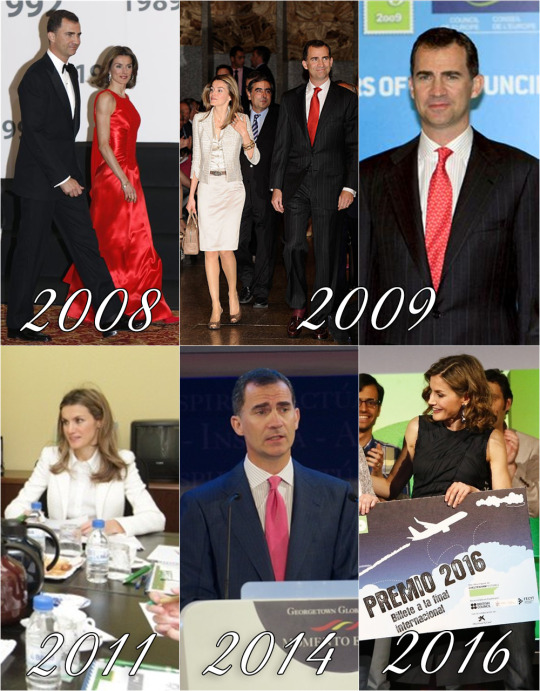
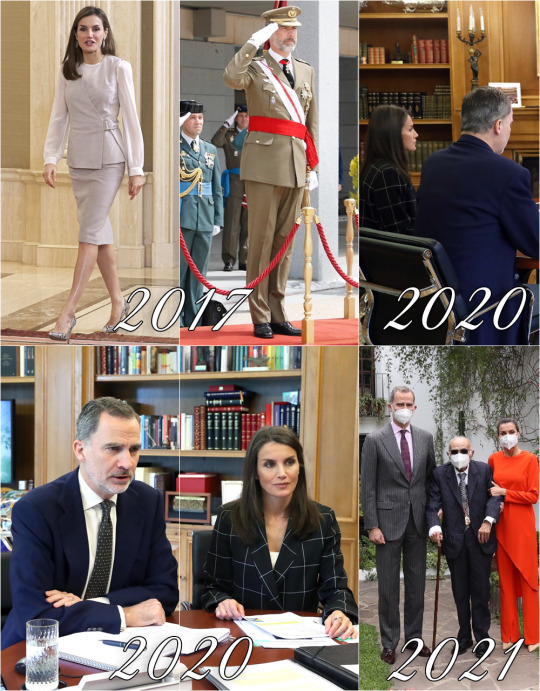
Felipe and Letizia retrospective: May 12th
2004: Luncheon offered by the president of the Spanish independent community Esperanza Aguirre (1, 2) & Bullfight at the San Isidro fair in the Ventas bullring in Madrid
2005: Balearic Tour - Day 4
2008: Lunch with the president of Ecuador Rafael Correa & ‘Actualidad Economica’ magazine 50th anniversary dinner
2009: Inauguration of the 119th Ministerial Session of the Committee of Ministers of the Council of Europe & 20th anniversary of the Foundation for the Development of Nursing (FUDEN)
2011: Working meeting with the Spanish Association Against Cancer (aecc)
2014: “Georgetown Global Forum” at the Palace Hotel in Madrid.
2016: Final of FameLab
2017: Audiences at la Zarzuela & Visited the Academy of Officers of the Civil Guard
2020: Videoconferences: President of the General Council Official Associations of Doctors & President of the General Council Official Colleges of Nursing
2021: Delivered the Miguel de Cervantes literature awards to Don Francisco Brines.
F&L Through the Years: 756/??
#King Felipe#Queen Letizia#King Felipe of Spain#Queen Letizia of Spain#King Felipe VI#King Felipe VI of Spain#F&L Through the Years#May12
6 notes
·
View notes
Text
fodlan nobility can be split into different assets: title, control of land, personal property, national responsibilities (adrestia seems to have the most formalized system with ministerial positions tied to houses, faerghus's lord act as advisors and leicester has no central government). can you see the cracks from which to more equally distribute power? control of land can be made into local/regional government operated separately from any noble house. national responsibilities can similarly be de-associated with nobility by having a formalized and functional national government and not whatever kangaroo court is happening in faerghus. seizure of personal property is basically what most revolutions do where you just take it you know redistribute wealth. forcefully ¯\_(ツ)_/¯. and at that point the title has no power so who cares if they keep passing it down you you can just outlaw hereditary titles. i really only think the first two and a half are necessary. oh well the rich dude gets to keep 1 fancy house, good enough.
2 notes
·
View notes
Text
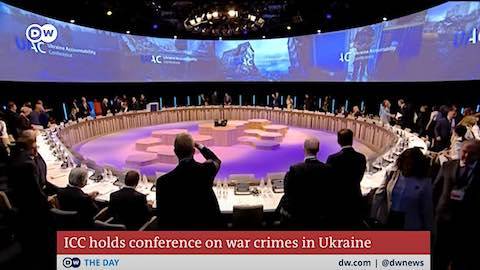
ICC Discuss Coordinating Ukraine War Crimes Probes in Hague
THE HAGUE, Netherlands / AP | 7/14/2022 — The International Criminal Court’s chief prosecutor called Thursday for an “overarching strategy” to bring perpetrators of war crimes in Ukraine to justice, and representatives from dozens of countries pledged to cooperate in their investigations.
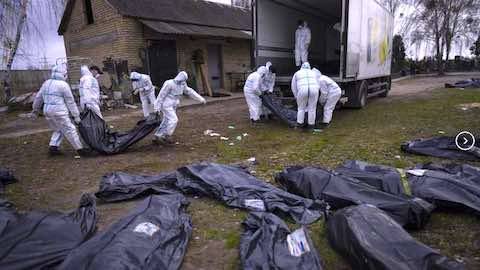
Since Russian President Vladimir Putin ordered the invasion of Ukraine on Feb. 24, his military forces have been accused of abuses ranging from killings in the Kyiv suburb of Bucha to deadly attacks on civilian facilities, including the March 16 bombing of a theater in Mariupol that an Associated Press investigation established likely killed close to 600 people.
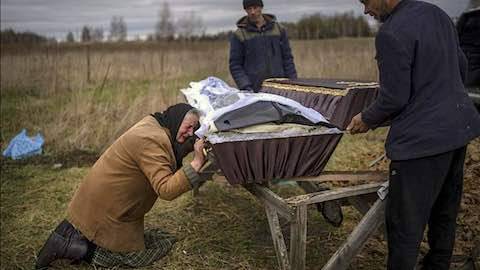
“The simple truth is that, as we speak, children, women and men, the young and the old, are living in terror,” ICC Prosecutor Karim Khan said as he opened the Ukraine Accountability Conference in The Hague. Khan said Thursday’s ministerial meeting addressed “a need of coordination, of coherence” and “the need of an overarching strategy” as different nations and courts work to investigate and prosecute crimes. …
Continue to read on AP: ▶️ https://apnews.com/article/russia-ukraine-putin-kyiv-netherlands-the-hague-d720ae1f6801731d1979dcdaa988997a
2 notes
·
View notes
Text

Today in Christian History
Today is Saturday, August 5th. It is the 217th day of the year in the Gregorian calendar; 148 days remain until the end of the year.
1590: Meletius Pegas becomes the Orthodox patriarch of Alexandria. He will endeavor to reunite the Greek and Coptic churches.
1604: John Eliot is baptized in England. His non-conformist views will eventually prompt him to move to America, where he will found fourteen congregations of Indian Christians, translate the Bible into Algonquin, and help prepare the Bay Psalm Book—the first book printed in America. Captured by Indians, he will learn their language while in captivity.
1720: Death in England of Anne Finch, Countess of Winchilsea, a notable poet and hymnwriter, loyal to King James II. Among her best-known religious poems is “The Atheist and the Acorn,” which depicts an atheist as a fool for trying to outguess God’s arrangements. She had also written a praise hymn beginning, “To the Almighty on his radiant throne / Let endless hallelujahs rise.”
1751: Rev. John Cuthbertson, America’s first Scottish Covenanter pastor, arrives in America. His name appears frequently as a genealogical authority because he will keep a log of births and marriages. In it, he records over five thousand family names as well as notes of six hundred marriages and almost two thousand baptisms he performs in the course of seventy thousand miles of ministerial travels.
1833: Allen B. Freeman, a young man recently graduated from a Baptist seminary, arrives to serve as a missionary in Northern Illinois, but will die of cold and exhaustion in December the following year after his horse collapses under him, forcing him to walk many miles back to Chicago.
1835: Death of Thomas McCrie, Scottish minister and church historian. He and three other divines had left the General Association Synod and formed the Constitutional Association Presbytery. He also wrote biographies of John Knox and Andrew Melville.
1844: The first assembly of Queen’s College, British Guiana, meets. The school has been established by Anglican bishop William Piercy Austin, a missionary to the South American colony.
1876: Scottish missionary Mary Slessor boards the SS Ethiopia to sail to Calabar (Nigeria). She shares the ship with a cargo of liquor.
1955: Death of Jesse Irvin Overholtzer, founder and first director of Child Evangelism Fellowship.
4 notes
·
View notes